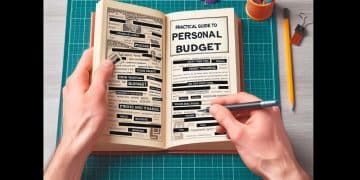Master Your Personal Budget: The Path to Lasting Financial Independence


Understanding Effective Personal Budgeting
The modern financial landscape makes controlling personal finances vital. In this environment, personal budgeting emerges as a key factor in achieving monetary stability. Whether saving for a significant purchase or planning for life’s later stages, budgeting offers a strategic plan to reach these ambitions. It’s not just about numbers; effective budgeting wards off financial missteps that cause anxiety and uncertain futures.
Anúncios
Today’s world, with its rapid pace, demands financial literacy as an essential skill. Personal budgeting grants you financial control, setting the stage for future success. It provides clarity on your financial standing, allowing proactive, informed decisions. Moreover, budgeting transcends simple accounting; it fosters confidence and peace, guiding you toward your financial goals. This article explores strategic budgeting techniques, empowering you to secure your financial future.
Personal budgeting, though often underrated, is essential for everyone. It transforms finances from a source of stress to an area of empowerment, offering a roadmap and promoting healthier financial practices. By setting a budget, individuals can identify priorities, allocate resources effectively, and lay the groundwork for achieving their financial aspirations. With effective budgeting, financial freedom becomes an attainable goal rather than a distant dream.
Setting the Foundation: The Basics
Creating a personal budget starts with understanding income and expenses. Calculating net income, which includes wages and any side earnings after deductions, provides a baseline. Tracking expenses unveils spending patterns and areas needing refinement. Before crafting your budget, it’s crucial to know your financial landscape, identifying essentials versus discretionary spending to retain control and flexibility.
Allocating funds to specific categories is next. Prioritize necessities, debts, and savings, aligning with defined short-term and long-term goals. Realistic goals make your budget actionable, paving the way for financial security. Common strategies include the 50/30/20 rule: allocate 50% of income for needs, 30% for wants, and 20% for savings and debt repayment. This framework supports a balanced approach toward financial health.
Flexibility is crucial in personal budgeting. Economic shifts necessitate periodic review and adjustment. Life evolves, and so should your budget. By adapting, you ensure your financial plan remains relevant and reflective of your current circumstances. Regularly assess changes in income, expenses, and aspirations, recalibrating to maintain progress. This adaptability keeps you positioned to handle unexpected financial challenges confidently.
Key Features of Personal Budgeting
- Financial Awareness: Understanding your spending habits.
- Debt Management: Systematic reduction of debt obligations.
- Goal Setting: Allocation for both short and long-term goals.
- Emergency Preparedness: Building a safety net for unforeseen events.
The Benefits of Implementing Personal Budgeting
Personal budgeting delivers numerous advantages. Financial awareness is a significant benefit, providing insights into expenditure and income. This awareness drives informed decisions about purchases and savings, helping avoid debt accumulation. Moreover, budgeting also aids in managing and systematically reducing existing debt, clearing the path for future investments and financial growth.
Goal-oriented budgeting ensures funds are allocated to priority objectives, transforming dreams into reality. From gaining financial stability to fulfilling aspirations, a budget supports achieving these ambitions. Additionally, it provides the structure to save for unforeseen expenses, cushioning against potential financial shocks and promoting a more security-focused mindset.
The peace of mind gained from budgeting is invaluable. Knowing there’s a financial plan reduces stress, allowing focus on achieving goals rather than worrying about money. Implementing a budget aligns spending with values, offering control and clarity. By empowering individuals to lead financially responsible lives, personal budgeting encourages disciplined, future-focused habits.
Opportunity identification is another significant benefit. While traditional budgeting focuses on spending and saving, modern approaches integrate income enhancement strategies. Encouraging side hustles, freelance work, or career growth, adds potential to increase financial resources. These ventures not only supplement income but also broaden financial horizons.
Personal budgeting, when practiced effectively, leads to a financially fulfilling life. It’s not about restriction, but rather about gaining freedom within boundaries. Through discipline and understanding, budgeting transforms financial challenges into achievements. Start with fundamental steps, gradually evolving to sophisticated strategies as your circumstances demand.
Effectively managing personal finances through budgeting is crucial to living a balanced, stress-free financial life. Far from a limiting practice, budgeting grants the freedom to pursue life’s goals with confidence and assurance. Embrace budgeting today, and navigate toward a promising financial future word by word, penny by penny.
- Peace of Mind: Reduced financial stress and anxiety.
- Opportunity Creation: Identifying new income pathways.
- Improved Financial Health: Foster disciplined saving habits.
- Enhanced Lifestyle: Align spending with personal values.
- Informed Decisions: Empowered monetary choices.





